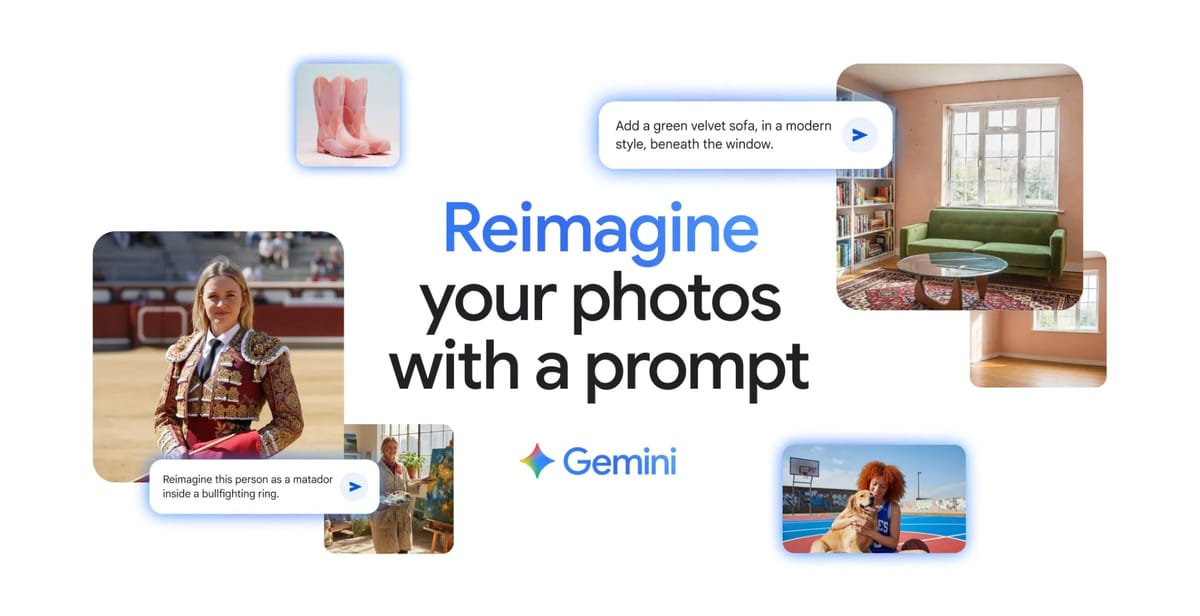Google just pulled back the curtain on tech's worst-kept secret: that mysterious "nano-banana" AI model that's been absolutely crushing it on LMArena's image editing leaderboards? Yeah, that was them all along. The company's launching Gemini 2.5 Flash Image today, and suddenly those cryptic banana hints from DeepMind's Demis Hassabis make a lot more sense.
Key Points
- Character consistency - Your face stays your face across edits, even when you're trying on a 60s beehive
- $0.039 per image through the API - Cheaper than your morning coffee, available now for developers
- Multi-image fusion - Drag yourself into any scene without looking like a bad Photoshop job
- Live now via Gemini API, AI Studio, Vertex AI; integrated into Adobe Firefly/Express starting September
Google's been quietly testing this thing in the wild, watching users lose their minds over an anonymous model that just... worked. In recent weeks, social media users raved over an impressive AI image editor in the crowdsourced evaluation platform, LMArena, which appeared to users anonymously under the pseudonym "nano-banana."
Google's specifically targeting the one thing that's been driving everyone crazy about AI image editing — keeping people looking like themselves. You know that uncanny valley feeling when you edit your photo and suddenly you're looking at your digital doppelganger's slightly-off cousin? Google claims they've fixed that.
The model brings four major upgrades that actually matter. First up, character consistency that maintains how you (or your dog, or your product shots) look across multiple images. Try putting yourself in Renaissance armor or your chihuahua in a tutu — you'll still recognize who's in the photo.
Second, they've baked in Gemini's world knowledge, so the model actually understands what you're asking for instead of just mashing pixels together based on keywords.
Then there's the multi-image fusion feature, which lets you blend multiple photos into something coherent.
Not the usual AI mashup that looks like someone sneezed on Photoshop, but actual photorealistic combinations. And the prompt-based editing? The model can blur the background of an image, remove a stain in a t-shirt, remove an entire person from a photo, alter a subject's pose, add color to a black and white photo — basically anything you can describe in plain English.
Importantly, all images created or edited with Gemini 2.5 Flash Image will include an invisible SynthID digital watermark, so they can be identified as AI-generated or edited. It's unclear as to whether the model supports the Coalition for Content Provenance and Authenticity (C2PA) for which Google became a steering committee member in early 2024.
The model is priced at $30 per 1 million output tokens, with each image costing 1,290 tokens, or $0.039 per image. And unlike some competitors, it's available through multiple channels — the Gemini app for regular folks, plus the API, AI Studio, and Vertex AI for developers and enterprises.
Midjourney's been dominating the artistic side of things with its v7 model, while ChatGPT has made it the go-to for people who just want something that works without learning Discord commands. Now Google's swooping in with a model that's technically superior (according to the benchmarks), cheaper, and available everywhere. And like image generation in ChatGPT, Google's positioning this as native multimodal intelligence — the model doesn't just process images, it understands them in context.
What's particularly clever is how they've been testing this. Instead of a big splashy announcement followed by disappointed users finding edge cases, they let it loose anonymously to see if it could actually compete. The fact that users organically pushed it to the top of the leaderboards? That's better validation than any press release.
The real test will be adoption. Google's got distribution through the Gemini app, but they're late to a party where creators have already built workflows around Midjourney and DALL-E. The API pricing might win over developers, and those AI Studio templates could lower the barrier for people wanting to build image apps. But convincing the Instagram filter crowd to switch from whatever they're using now? That's a different challenge.
For now, though, Google's made their move. They've got a model that benchmarks say is the best, pricing that undercuts the competition, and distribution channels that reach from your phone to enterprise clouds. They've even partnered with OpenRouter and fal.ai to extend their reach. Whether that's enough to win the AI image wars remains to be seen, but at least we finally know what all those banana references were about.

